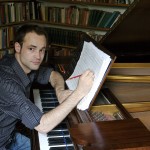Artist Portrait: Nathan Williamson
 Nathan Williamson is a pianist, composer and conductor with ties to both the UK and the US. We chatted via email about his musical growing up, his musical mentors, balancing a varied career, his current projects, and more. Enjoy!
Nathan Williamson is a pianist, composer and conductor with ties to both the UK and the US. We chatted via email about his musical growing up, his musical mentors, balancing a varied career, his current projects, and more. Enjoy!
What was growing up in music like for you? Was there a special moment when you knew you were a musician?
I didn’t really grow up with a formal musical background as such – my parents simply loved music and were always encouraging (and sometimes insisting!) that we did it. I had music lessons just the same as any other lessons – it was simply considered an essential part of growing up. There was lots of music in the home, church, school, plays – singing rather than playing. Until I was about 16 I spent considerably more time singing than on any other musical activity.
Music was always tremendous fun, focused on expression and exploration rather than a technical discipline. But it was also something to respect and aspire to, not messed around with. We were encouraged to look up to people who were more advanced, and were sometimes told we weren’t ready to do this or that yet, or we would have to prove we were committed in order to do such and such. I think that was a tremendously important lesson for me – combining the freedom of doing something without concern or fear and the respect to do it as best you can.
I knew I was a musician when I was 12 and sitting in a practice room at school trying to compose, which I didn’t have the foggiest idea how to do. Suddenly two hours had gone by and I saw there were 6 bars of music on the page – I had no idea how they got there and still to this day cannot believe I wrote them. Somehow I had made a breakthrough – I’d got under the music’s surface, into its cogs and levers, and understood how it was made. It felt as if I’d unlocked some enormous cosmic formula. I didn’t suddenly love music any more than I did before – I was addicted because I understood it, and could learn more and try anything I wanted. (Passion and understanding are never, in my opinion, two different things. After all, you can only be passionate about something once you have seen and understood it as exciting in some way).
Was there a noticeable turning point when you knew you wanted to perform, compose, and conduct?
Well, of course dreaming away as a teenager and launching a professional career are very different things. One has to learn an enormous amount to be a musician (of whatever kind) with a vast amounts of musical material and technical skills to master. One has to be focused and mature, practical and realistic, good with money and opportunities, sensible with your time, thick skinned but also very sensitive, determined and uncompromising but also very flexible, rigorously disciplined but totally free, all at the same time. It requires sacrifice and sometimes compromise.
But I believe one’s wildest dreams and memories should be celebrated and cherished and loved, not expunged from us as we rigorously train ourselves to be a professional. I don’t really see the point of getting to the top of one’s game if you have to shed all your ideas and motivations in the process. As I get older I realise I was wiser as a child than I am now in so many ways, and I want to make music the way I did then, but of course with the knowledge and experience I have learned since. All those years of work and study should let you be free to be yourself, not make you more restricted and somehow neutered as an artist. Schoenberg and Webern (ironically often celebrated, or criticised, for the more rigorous technical aspects of their music) said exactly the same thing.
How do you balance the various facets of your career?
People often ask me if I focus more on composing or performing, but to me any music-making at all is very much the same process, whether it is preparing a score, composing, practicing, or whatever. The only concerns are practical – obviously, editing a set of parts for an orchestra piece the night before a concerto is far from ideal. And performing does require you to be in good shape technically, and that takes a certain amount of time out of your day. But in terms of the activity, composing or performing is all just one big creative process to me. I always try to approach composing like a performer would, and see other people’s music like they did, as its composer.
Who have been your greatest mentors?
Malcolm Singer, who taught me at the Guildhall for five years and later invited me to teach at the Menuhin School, has been the biggest presence in my career, and continues to offer advice and guidance. He not only taught me a huge amount about composition and the creative process (mainly how simple it really is) but he was the calming influence that enabled me to complete my degree through all manner of rather turbulent events at the Guildhall. So without having met him I doubt I would ever have completed my studies in one piece and become a musician at all. I still try to play him any major works I am studying for the first time. We have regular stimulating disagreements over various small things but are in absolute agreement on one or two very important things.
My other most profound influence was Joan Panetti. I was her assistant at Yale for two years. She had an utterly extraordinary approach to music, and the most phenomenal ear. She taught a class (having invented it) called ‘Hearing’, which sounds a bit odd, but basically involved studying music the ‘wrong’ way round – instead of looking at it on the page and making notes into sounds, we would listen to it and try and capture it on the page in a way which reflected what we heard. When I put it like that it sounds little more than an interesting experiment and her classes, to be fair, were often total chaos, but her analysis of even a bar of music led you to question everything you thought you knew and literally hear things you had never heard before.
Her approach was visionary, incredibly technical, philosophical and deeply romantic. She probed relentlessly into music for its meaning and purpose, questioning everything a composer wrote and always searching for a bigger meaning, or function, behind the notes – in fact, now I come to think of it, ‘what the notes were’ was never of any interest to her whatsoever. On one occasion she spent over half an hour explaining to me why two consecutive notes in a piece I had written were not expressing what I had, on account of what she had heard in the rest of the piece, apparently wanted them to express. About two hours later we were still arguing about it. If she would do that over two notes, just imagine what she was like on a phrase of a Bach Chorale, let alone a movement of a Haydn String Quartet. Whether or not you agreed with her or not was never the point – she just made you think about music and hear everything in a completely different way. It was like talking to someone about jewelry who had spent half their life mining precious stones on another planet.
What are some of the most humorous things that have happened to you musically?
I was once offered £5 by every member of a 100-piece orchestra to wear a dress in a concert – and as a keyboard player I was only playing a small part in one piece at the back, so would have got away with it, but just couldn’t do it.
A member of a board of a symphony orchestra once told me that he was surprised I was a composer because he thought all possible combinations of music had been used up. That was pretty hilarious – or at least it would have been if he hadn’t been actually involved in running an orchestra.
Then on one occasion after a concert in which I had been performing (among other things) one of my own compositions, I was chatting to a few members of the audience, and one of them asked a lady standing nearby, ‘Did you like his new composition?’ – and she said, ‘Oh hello, you’re the composer. Yes, you know, quite modern, but very interesting. I would like to hear it again. Did the pianist commission it from you?’ I then had to politely explain it was me who she had just been listening to for the last 90 minutes…
Talk a bit about your music for piano and works that include piano such as the Cello Sonata. How do you approach the piano as an ensemble instrument vs. a solo instrument?
I find the piano on its own very hard to write for. I get lazy and resort to simple piano patterns picked up from some repertoire I’ve been practicing. I often find it productive to pretend I am writing for other instruments and then move it over to the piano when I have established some of the ideas. Some of my best piano music has come when I pretend I am writing for harp, because you have the choose the notes much more carefully and can’t resort to clichéd piano chords and sounds, but it does have many close similarities nonetheless. When one is working on piano repertoire one is always encouraged to think of how it would work on other instruments, or orchestrate it, or to sing the lines as well as play them – so maybe the same works in reverse.
In chamber music I generally see the combination of instruments as an orchestra but just written on fewer staves. Most orchestral works up until the 20th century could have been written very successfully for piano trio, quartet, etc., and vice versa (and in fact many of them were).
What are your current projects? I find your multi-piano project & the piano pieces in collaboration with visual artists in residence to be very interesting & I’m sure there are more in the works.
So yes, a lot of piano music at the moment, namely my Variations being done over the summer in a few places, and then I’m based in Aldeburgh for a week in July with the artist Fran Crowe, who works with things picked up off the beach. That’s going to be fascinating. I’m hoping some of her way of seeing unusual objects (mainly rubbish) as potential artwork might stimulate some new ways of hearing sounds and musical ideas and forms. (note – concerto for piano and nine instruments was in 2013…)
Then there is the Cello Sonata to finish, and then I have then decided I am going to spend the autumn tinkering with one or two old pieces which I think are good, but not quite there, and start releasing more of them and sending them round to people. I’m very cagey about old pieces – I hold onto them and sometimes revise them before I let them ‘out’.
There are then various recordings in the pipeline, some of me performing solo piano repertoire, some of other people performing my own compositions, and me performing my own repertoire as well. And more concerts of course, but fewer than I did in the last few years, as I want to spend more time composing for the coming year or so. But I am doing some Beethoven and Schumann concertos, and lots of contemporary and 20th century piano music.
I see you have taught at the Menuhin School. What role does teaching take in your career now?
Teaching is incredibly hard work and even doing it part-time demands tremendous commitment and energy – and with other things going on I didn’t feel I could continue to do it as much as I was. I have a few piano students in Suffolk, which I enjoy immensely, but that’s all I’ve got time for right now. I have no doubt there will be more teaching in the future, but for the moment I’m happy to leave it till then…
Contact Nathan Williamson:
If anyone wants to see any of my new piano music when it comes out later this year, I’d be delighted to send stuff around. I self-publish, so drop me a line via www.nathanwilliamson.co.uk


